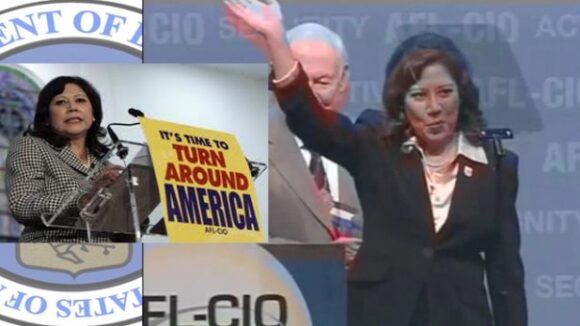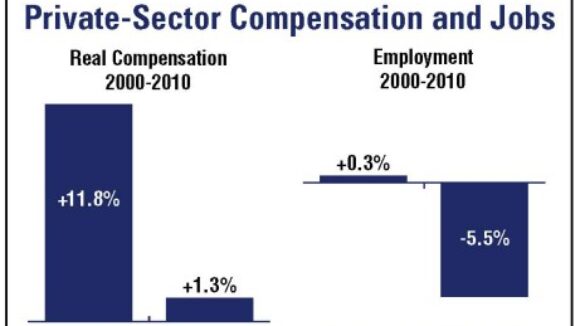Obama Labor Sec. Solis as "Clueless" about jobs as he is
But, she blames Texas’ job growth on the fact that it is a Right to Work state. From Investor.com’s Ralph R. Reiland: A Labor Chief As Clueless As The President On Aug. 31, with…

But, she blames Texas’ job growth on the fact that it is a Right to Work state. From Investor.com’s Ralph R. Reiland: A Labor Chief As Clueless As The President On Aug. 31, with…
National Right to Work President Mark Mix makes the critical distinction between "Labor Day" and "Union Day," a distinction that union bosses chose to ignore: By Mark Mix Most Americans realize that Labor Day is about celebrating workers, not union bosses, but that won’t stop Big Labor’s apologists from stealing to spotlight to demand more power. The fact is that modern unions are built on the legal privilege of compulsion. In 28 states without Right to Work laws, nonunion employees can be fired for refusing to pay union dues. Millions more nonunion workers have no choice but to accept union bargaining over their wages and working conditions. What’s more, union officials routinely funnel nonunion workers’ dues into political campaigns aimed at defending or expanding their already extensive special privileges. As legislators from Wisconsin to Ohio can attest, this perverse cycle has made it extremely difficult to roll back union bosses’ workplace powers. Big Labor thrives on a system of government-granted special privileges. But what do workers get out of this arrangement? According to union apologists, they’d be helpless without it. But the facts reveal a different story. Compulsory unionism makes union bosses unaccountable to rank-and-file workers, whose financial support is absolutely mandatory. After all, why should union officials bother with the hard work of representing employees if they’re sitting on a forced-dues revenue stream guaranteed by the government?
From Dr. Perry’s Carpe Diem blog: In the video above, President Obama’s Labor Secretary, Hilda Solis, explains why she recently bought a new Chevy Equinox: “What better example could I set if I…
With the help of National Right To Work Legal Defense Attorney Bill Messenger, UFCW former union steward Chris Mosquera seeks to force U.S. Labor Secretary Hilda Solis to reverse her regulations that rescinded disclosure of union boss benefits, insider deals, and sources of receipts. Forced-dues fill Big Labor treasuries with cash that all-too-often union bosses turn into private slush funds awarding themselves handsome benefits. From the Mosquera's Op-Ed in the Washington Examiner: Without stringent disclosure requirements, union members and nonmembers alike are left at the mercy of union officials who have the power to collect dues without being held accountable for how that money is spent. The public reporting guidelines Solis jettisoned included several common-sense additions to the Labor Management Relations Disclosure Act of 1959. Under the proposed guidelines, union officials would have to disclose how much individual compensation they receive in the form of benefits, account for any travel and entertainment expenses, and identify union income streams. The fact is most workers want more information about how their money is being spent by union officials. Last year, a poll revealed that nearly 90 percent of union members support strong union transparency requirements. Disclosure is a simple but effective tool for fighting corruption and encouraging accountability. If union officials know their spending habits are part of the public record, they'll be less interested in expensive getaways and more interested in effectively managing their members' hard-earned dues.
With the help of National Right To Work Legal Defense Attorney Bill Messenger, UFCW former union steward Chris Mosquera seeks to force U.S. Labor Secretary Hilda Solis to reverse her regulations that rescinded disclosure of union boss benefits, insider deals, and sources of receipts. Forced-dues fill Big Labor treasuries with cash that all-too-often union bosses turn into private slush funds awarding themselves handsome benefits. From the Mosquera's Op-Ed in the Washington Examiner: Without stringent disclosure requirements, union members and nonmembers alike are left at the mercy of union officials who have the power to collect dues without being held accountable for how that money is spent. The public reporting guidelines Solis jettisoned included several common-sense additions to the Labor Management Relations Disclosure Act of 1959. Under the proposed guidelines, union officials would have to disclose how much individual compensation they receive in the form of benefits, account for any travel and entertainment expenses, and identify union income streams. The fact is most workers want more information about how their money is being spent by union officials. Last year, a poll revealed that nearly 90 percent of union members support strong union transparency requirements. Disclosure is a simple but effective tool for fighting corruption and encouraging accountability. If union officials know their spending habits are part of the public record, they'll be less interested in expensive getaways and more interested in effectively managing their members' hard-earned dues.

By prohibiting compulsory union dues, state Right to Work laws spur the growth of private-sector employee compensation in the form of wages, salaries, benefits and bonuses, as well as employment growth. Sources: U.S. Commerce Department, U.S. Labor Department Private-Sector Compensation Growth Lags in Forced-Unionism States (Source: June 2011 NRTWC Newsletter) Even union bosses and their apologists sometimes grudgingly admit that long-term private-sector job growth in states that currently have Right to Work laws on the books far outpaces job growth in states that lack such pro-employee statutes. This fact is indeed hard to deny. From 1990 to 2010, according to the U.S. Labor Department, private-sector payrolls in Right to Work states soared by 32.0% -- an increase triple that of forced-union-dues states combined. Over the past decade alone, nationwide private-sector employment fell by 3.3% due to the impact of the severe 2008-2009 recession. But Right to Work states experienced an overall private-sector job increase, while forced-unionism states suffered a 5.5% aggregate job loss. Big Labor tries to downplay the significance of Right to Work states' large, persistent employment-growth advantage by suggesting that the jobs created outside of forced unionism's dominion are "the wrong kind." Unfortunately for union propagandists, however, U.S. Commerce Department data show that Right to Work states also enjoy a large, persistent advantage over forced-unionism states with regard to growth of private-sector employee compensation (including wages, salaries, bonuses and benefits). Real Compensation Grew Nine Times as Much Over Past Decade In Right to Work States
Former murdered Mineworkers International presidential candidate “Jock” Yoblonski’s campaign manager and Weekly Standard Executive Editor Fred Barnes reminds us that Obama has created more Big Labor Boss paybacks than just the NLRB v. Boeing case. Besides the Obama National Labor Relations Board’s assault on Boeing’s South Carolina employees and workers in Right To Work states in general, Barnes mentions the recent new regulations proposed by DOL to hamper employees getting to hear both sides of the story during union organizing campaigns. But, the main focus of the article is the Obama Administration’s repeated attempts to overturn multiple defeats of unions to organize DELTA airlines. If you want to get more outraged at the Obama administration for its continuous assaults on free enterprise and individual employee choices, then read Barnes’ America’s Labor Party, Is there anything Obama won’t do for unions? Here are a few quotes to whet your appetite: How far will President Obama go to advance the interests of organized labor? Awfully far. We know this not only from the effort to keep Boeing from building a plane in a right-to-work state, South Carolina, but also from the way Delta Airlines is being railroaded into recognizing unions its employees have repeatedly rejected.
Former murdered Mineworkers International presidential candidate “Jock” Yoblonski’s campaign manager and Weekly Standard Executive Editor Fred Barnes reminds us that Obama has created more Big Labor Boss paybacks than just the NLRB v. Boeing case. Besides the Obama National Labor Relations Board’s assault on Boeing’s South Carolina employees and workers in Right To Work states in general, Barnes mentions the recent new regulations proposed by DOL to hamper employees getting to hear both sides of the story during union organizing campaigns. But, the main focus of the article is the Obama Administration’s repeated attempts to overturn multiple defeats of unions to organize DELTA airlines. If you want to get more outraged at the Obama administration for its continuous assaults on free enterprise and individual employee choices, then read Barnes’ America’s Labor Party, Is there anything Obama won’t do for unions? Here are a few quotes to whet your appetite: How far will President Obama go to advance the interests of organized labor? Awfully far. We know this not only from the effort to keep Boeing from building a plane in a right-to-work state, South Carolina, but also from the way Delta Airlines is being railroaded into recognizing unions its employees have repeatedly rejected.

Tired of not seeing where his forced union dues go and disgusted with the the U.S. Department of Labor’s decision to help union bosses conceal their extravagant benefit packages, UFCW member Chris Mosquera has filed suit challenging the Secretary…